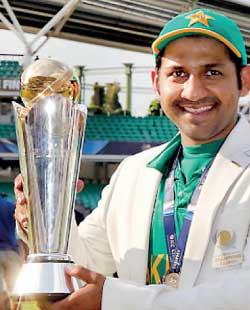21 Jun 2017 - {{hitsCtrl.values.hits}}
 Who says the Sinhalese are anti-Muslim? The way in which the Sinhalese craved for and cheered the victory of the Pakistan team at the ICC finals against India on Sunday leaves very little doubt that the community is inherently prejudicial against Muslims as a group, local or otherwise. If not for the politicians from both sides who instigate people with their inflammatory speeches and misinformation, the two communities would have been left with very little to fight about.
Who says the Sinhalese are anti-Muslim? The way in which the Sinhalese craved for and cheered the victory of the Pakistan team at the ICC finals against India on Sunday leaves very little doubt that the community is inherently prejudicial against Muslims as a group, local or otherwise. If not for the politicians from both sides who instigate people with their inflammatory speeches and misinformation, the two communities would have been left with very little to fight about.
While that remains a fact, imagine a scenario where India is pitted against England or Australia in the finals. Would the majority Sri Lankans have supported either side? The answer would have been a safe ‘no’. Cricket fans here would have still watched the match purely for entertainment’s sake but would not have supported any team. After all why should we bother – it’s a game between titans.
On the other hand if Bangladesh made it to the finals against India we would have surely backed the Bangladeshis. If New Zealand or South Africa was pitted against India we would have wanted India to lose just to see how Virat Kohli would eat humble pie. His arrogance is something we Sri Lankans are yet to reconcile with. On the other hand if the Indian team was skippered by a gentlemanly leader like yesteryear star Rahul Dravid, we perhaps would not have wished them doom. After all we cannot bear to see one of the game’s most respected gentlemen in this part of the world, Dravid, down in the dumps.
While it’s a fact that it is the absence of prejudice that saw Sri Lankans backing Pakistan at Sunday’s final of the ICC tournament, it is also true that our island-nation did not back the South Asian friend for being a Muslim nation.
Why did Sri Lanka then back Pakistan at the finals? We would have even supported them even against England and Australia in the finals. After all there’s a notion that people like to identify themselves with winners and India, Australia and England appeared to have bigger chances of victory even though cricket is such an unpredictable game.
Chances are that the reason Sri Lanka backed a disadvantaged team against a strong team has its roots in what psychologists term as the “Underdog effect” theory.
Ever since the research essay “Rooting for (and then abandoning) the underdog” was published in the Journal of Applied Psychology in 2008 much has been written on as to why we human beings have a tendency to support the underdog or the one at a disadvantage. Compiled by a group of scholars, bulk of them from the University of Richmond, Virginia, the research was based on the extensive study on the human behavior in the fields of sports, business and art.
The studies that followed this research, especially in neuroscience, speak volumes of the fact that humans are generally wired to support and sometimes identify themselves with the one who has less chances of winning. Sri Lankan fans who saw the ups and downs of our own team in the run up to the 1996 World Cup victory surely could relate to the “self-relevance” factor in the theory. This factor it seemed triggered, what neuroscientists term as, “Emotional Contagion” or catching an emotion of the underdog, among Sri Lankan fans.
Pakistan no doubt came to the tournament with a bulk of the features of an underdog. The security situation in their country forced them to play most of their matches in the UAE instead of their own country. Besides, their rivalry with India has cost them not only politically, socially and economically but in the field of cricket as well. The income of the Pakistan players remained very much low compared to almost all other main cricket playing nations and it is said their earnings were something like one-fourth of what Sri Lankan players earn. Their inability to play matches with India, which usually remunerates players handsomely, would no doubt have been a contributory factor to this state of affairs.
Pakistan entered the ICC tournament while it was ranked in the unenviable eighth position, even behind Bangladesh, in the ODI ranking of the ICC.
Supporting the underdogs, according to scientists, provides us with an opportunity to address the perceived grievances in the world as well. The Indian decision to exclude Pakistan players from the Indian Premier League (IPL) tournaments was initially seen as a handicap for Pakistan. However, later this proved to be a blessing in disguise as it deprived Indian players the chance to get to know the bowling and batting techniques of key Pakistan players. The result was there to be seen. The way Pakistan turned the tables on the mighty Indians is sure to be etched in the memory of cricket fans the world over.
30 Oct 2024 27 minute ago
30 Oct 2024 33 minute ago
30 Oct 2024 38 minute ago
30 Oct 2024 2 hours ago
30 Oct 2024 2 hours ago